Washington Hall Association and Building
The Washington Hall Association was incorporated by an Act of the General Assembly of the State of Virginia March 22, 1850. Investors, in accordance with the act, agreed to "take and pay for a large amount of stock in said association for the purpose of erecting a public building in the city of Wheeling; the first story of which it is contemplated to use for business rooms; the second story to be used as a hall for the accommodation of public assemblies, lectures, musical concerts, scientific and other exhibitions, and such other purposes as the company of board of trustees may deem expedient; and the third story to be used for such purposes as the said association of board of trustees may from time to time order and direct. . ."[1]
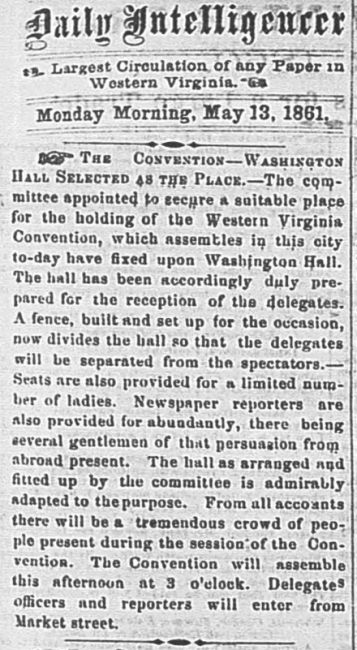 Construction on the first Washington Hall structure, which was described as being "designed in the Gothic Revival style, [2]" began in the year 1851. Though the Hall did not officially open to the public until November 26, 1853, in January of 1853, a reception celebrating the opening of the Baltimore & Ohio Railroad, a pivotal moment in Wheeling's economic history, was held within the hall.
Construction on the first Washington Hall structure, which was described as being "designed in the Gothic Revival style, [2]" began in the year 1851. Though the Hall did not officially open to the public until November 26, 1853, in January of 1853, a reception celebrating the opening of the Baltimore & Ohio Railroad, a pivotal moment in Wheeling's economic history, was held within the hall.
Washington Hall is best known, however, for the role it played in West Virginia statehood. The first Wheeling Convention of the people of North Western Virginia was held in Washington Hall, May 13-15, 1861. The Convention was held to determine what action should be taken as a result of the secession of Virginia from the Union. The first session of the second Convention was also held at Washington Hall, but subsequent sessions of the second Convention were then moved to the U.S. Custom House in Wheeling (now known as West Virginia Independence Hall). During Wheeling's second stint as the state capital, for a brief period, the West Virginia House of Delegates held sessions at Washington Hall.[3]
The original Washington Hall was destroyed by fire on November 30, 1875. A second Washington Hall, which also housed the Grand Opera House, or Grand Theater, was built on the same location in 1877. The new structure was "rebuilt in a completely different configuration, with a prominent angled entrance on the street corner, and finished in a florid Ruskinian, or High Victorian, Gothic style."[4] The Grand Opening of the new Washington Hall took place on February 5, 1878, celebrated with a revival rendition of the play "Uncle Tom's Cabin" within the new Opera Hall.
After being purchased by the German Bank of Wheeling in late 1898, an extensive remodel of this second structure, designed by Wheeling architect Frederick Faris, was completed in 1911. "Faris emphasized the angled corner entrance, but otherwise completely altered the building into one of Wheeling's most accomplished and individualistic classical essays. He treated the first two floors architecturally as a single vertical unit, terminating them with an entablature that acts as a belt course for the four stories above. The bays of the upper stories are divided by rudimentary pilasters with rococo, Corinthian-esque capitals that support a heavy entablature and solid, paneled balustrade."[5] This structure still stands today, and is known as the Laconia Building.
[1]: Acts of the General Assembly of Virginia Passed at Extra and Regular Session in 1849 & 1850, 179-180 Richmond: William F. Ritchie, 1850.
[2, 4, 5]: Chambers, S. Allen. Buildings of West Virginia, 345-346. Oxford: Oxford University Press, 2004.
[3]: Wolf, Edward C. "Wheeling's Victorian Theaters and Concert Life." Upper Ohio Valley Historical Review XVII (1988): 20.
Location
▶ Northeast Corner of 12th and Market (original structure no longer standing)
The orignial Washington Hall [1851] was destroyed by fire in 1875. The former site of Washington Hall is the current location of the Laconia Building, formerly the German Bank of Wheeling [1911 remodel] and the Grand Theatre or Grand Opera House [1877] previous to the German Bank remodel.)
Images
▶ Original Washington Hall: 1851-1875
|
|
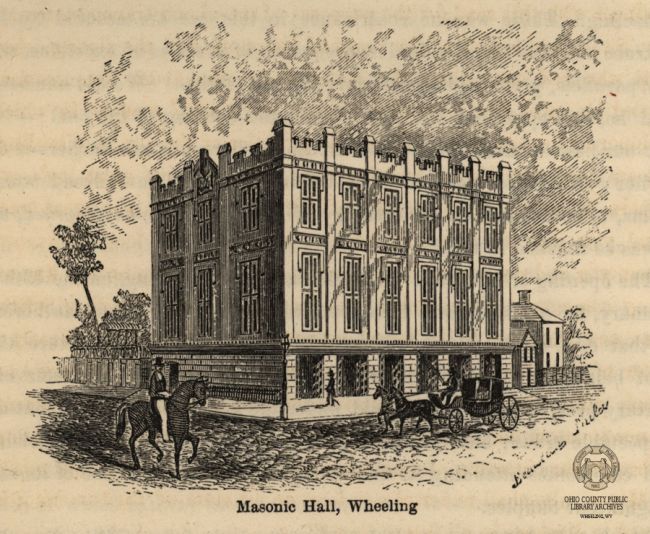
- image from "Rambles in the Path of the Steam-Horse," Eli Bowen, 1855. Ohio County Public Library Rare Books Collection.
|
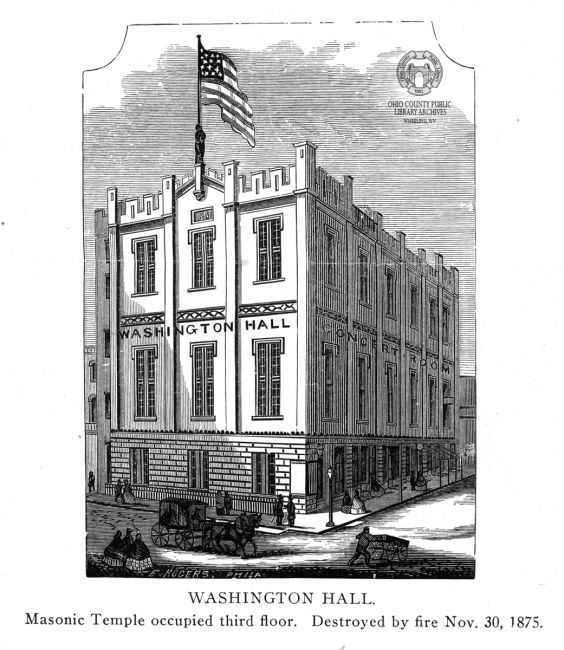
- image from the collections of the Ohio County Public Library Archives
|
▶ Second Washington Hall: 1877-1911
|
▶ 1911 Remodel: 1911-present
|
|
(also known as the Grand Theater or Grand Opera House, bought by The German Bank in 1898)
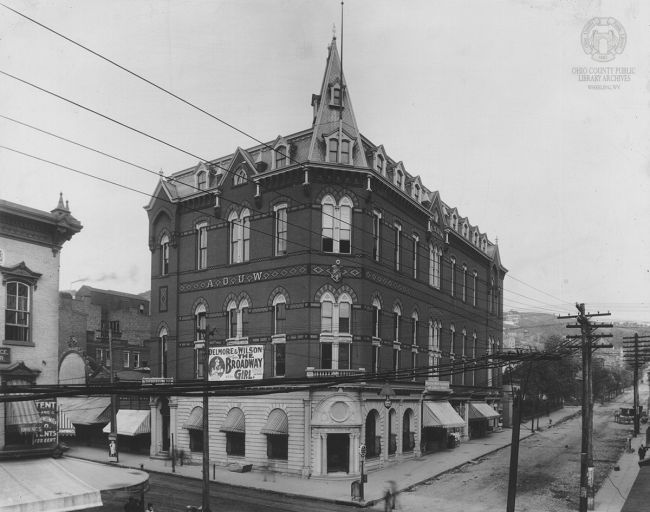
- image from the W. C. Brown Collection of the Ohio County Public Library
|
(Called The German Bank Building, now the Laconia, Building with Faris designed stone facade and additional 3 floors added.)
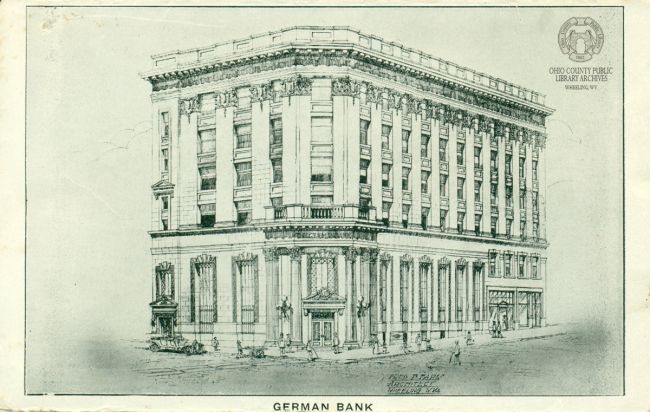 - image from "Souvenir Views of Wheeling," 1915, collections of the Ohio County Public Library Archives - image from "Souvenir Views of Wheeling," 1915, collections of the Ohio County Public Library Archives
|
Notes
- According to the Wheeling Daily Intelligencer of January 14, 1853, a boisterous celebration at Washington Hall (that may have lasted several days) was held a few weeks after the last spike was driven at Rosbys Rock on Christmas Eve 1852, connecting the Baltimore & Ohio Railroad from the East Coast (Baltimore) to the Ohio River Valley (Wheeling). The German Band played as more than 1000 celebrants — including dignitaries like Thomas and Michael Sweeney, Thomas Hornbrook, John McLure, William Paxton, Peter Yarnall, William F. Peterson, and Dr. Simon Hullihen — feasted on an elaborate bill of fare including buffalo tongue, stewed oysters, cutlets of veal, and “saddle of mutton,” (among many other exotic dishes) and many toasts were drunk to the new union of Baltimore and Wheeling. The banquet followed a formal reception at the Wheeling Court House where Mayor Nelson and B.&O. President Swann and the governors of both Virginia and Maryland delivered speeches.
▶ Read an account of this celebration from the book, "Rambles in the Path of the Steam-Horse," Eli Bowen, 1855.
- The West Virginia House of Delegates was holding session in the Hall when it caught fire on November 30, 1875. The fire was reported to have been small enough to have been able to be put out with no more than 12 buckets of water. A series of misfortunes, however, lead to the fire becoming out of control and the ultimate demise of Washington Hall caused some controversy. (Daily Intelligencer, December 1, 1875)
▶ Read the Intelligencer article about the fire
▶ Read the Intelligencer article about how the fire effected the Legislature and Courts
- Regarding the remodeling of the Grand Theatre: the highlighted text is from "Industrial World" (a trade Magazine published weekly in the interest of Iron, Steel, Coke and Allied Industries), 45th Year, No. 20, Monday, May 15, 1911, Pittsburgh, Pa.
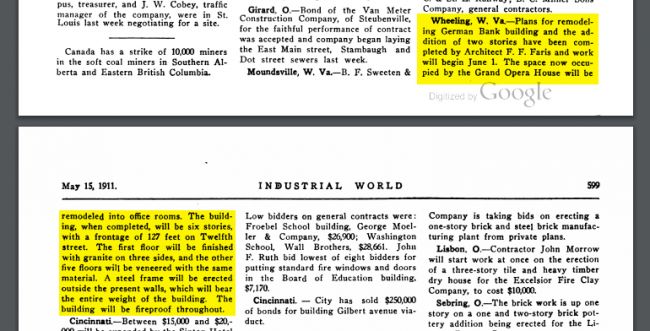
Additional Resources
Materials in the Library's Archives: (non-circulating, view by appointment only*)
*Call 304-232-0244 or send an email to make an appointment to view archival materials.

